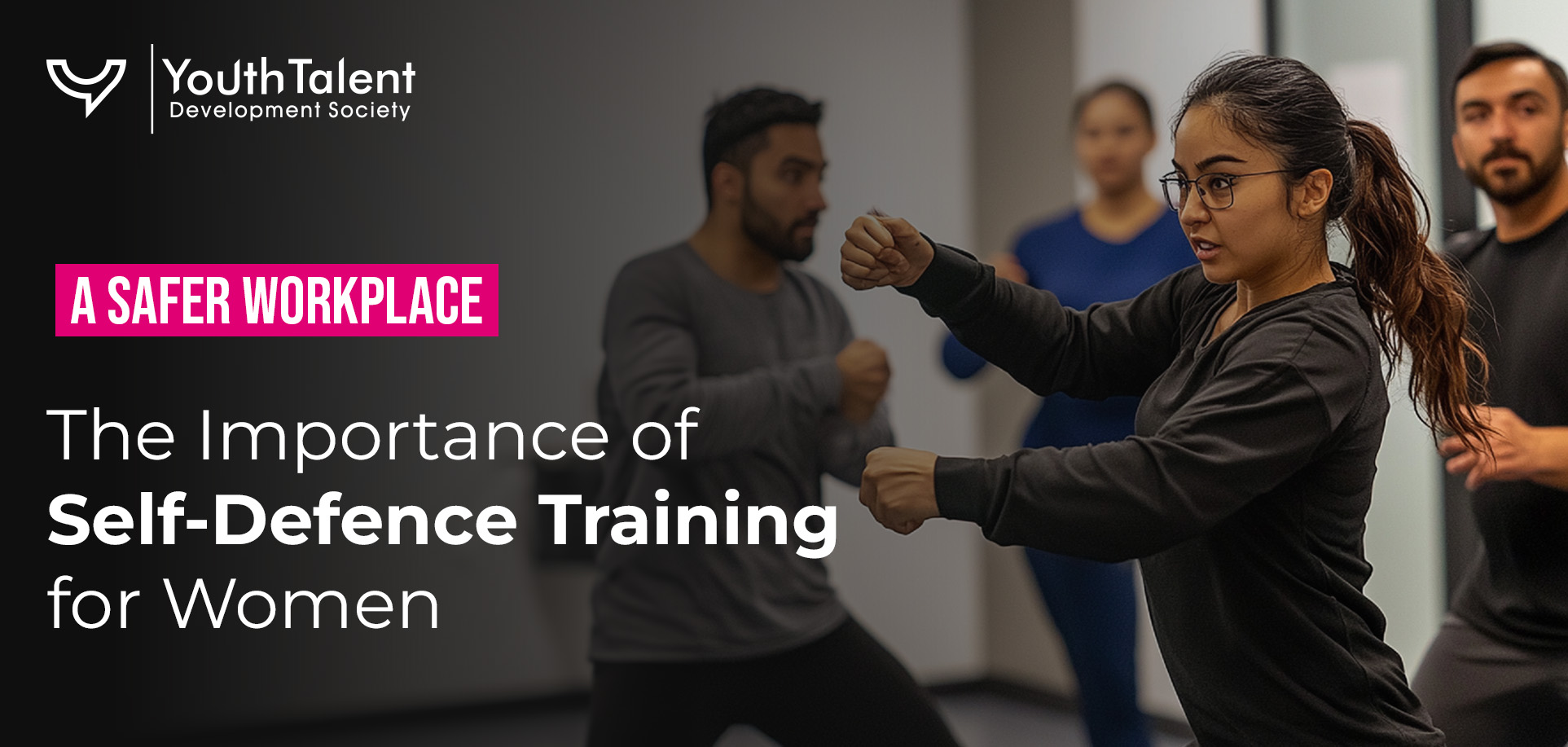
A Safer Workplace: The Importance of Self-Defence Training for Women
The whole talk about the security of workers including women is gaining grounds these last years. The incidences of harassment and violence in the workplace have reiterated the importance of the implementation of measures that ensure safe working environments for female employees. Self-defense training has emerged as one of the most important aspects of safeguarding the workplace and making women comfortable moving through their spaces with full confidence and determination. In this blog, we shall discuss the increasing need for workplace safety, self-defense training, its benefits for women in the workplace, and how organizations can inject this important training into their culture.
The Rising Need for Workplace Safety
Statistics currently link workplace harassment and violence to percentages of women who would testify to some form of experience, revolving such forms only to the experiences of verbal assaults, physical violence, or unwelcomed advances with even more serious forms attached to them. Compromising, thus are not only the safety features for women at work but also the atrocities causing a toxic work environment.
It cannot be underrated concerning the psychological dimensions of workplace harassment with particular meanings for women harassed. Even beyond the confines of the workplace, these emotions of self-worth and anxiety might result in depression; thus, most harassment cases have implications outside the job, affecting overall life experience and personal life. Organizations should understand that harassment can have psychological effects on employees and, therefore, take proactive measures to prevent such occurrences.
There are, however, legal requirements to enhance safety at the workplace. All organizations offer their employees a safe working environment by law. Ineffective handling of harassment matters may lead to severe legal consequences such as unbearable cost penalties or sued cases against the organization. Apart from the protective measures given to employees against the acts of violence associated with them, safety measures such as self-defense training will also prevent legal risks for organizations.
Why Self-Defence Training is Crucial?
Self-defense training has continued to play a major role in women's lives in workplaces for several reasons. It builds confidence and self-esteem. Women who learn that they could protect themselves are more likely to assert themselves in dangerous situations. This self-confidence may translate itself into the improved performance of women in workplaces as well as a much stronger presence.
Apart from self-confidence, self-defense training educates women on the proper techniques with which they can defend themselves when faced with a dangerous scenario. This could teach a woman a bit of security that would let her feel she can be bold in her workplace environment. Self-defense training would comprise areas of technique like physical maneuvers, verbal de-escalation tactics, and escape strategies-all of which become dear to you with regard to personal safety.
Self-defense training entails several parameters of concepts like situational awareness and risk assessment competencies. Knowing one's environment and being able to distinguish possible threats can enhance personal safety significantly. Self-defense training teaches women to read warning signs and take action so they can avoid hazardous situations before escalating.
The Benefits of Self-Defence Training for Women in the Workplace
Training for self-defense is useful in much more than just being a defense mechanism to meet situations of danger. It reduces the greatest fear, which is always the fear and anxiety which attend threats of danger. Many women have reported that after taking self-defense classes, they feel secure and at ease in their workplaces. This natural feeling of safety is often associated with improved productivity at one place of employment and a pleasant satisfaction with that job.
Self-defense training increases assertiveness. When women feel empowered to protect themselves, they are more likely to voice their opinions, fight harassment, and advocate for their rights. This assertiveness creates a better workplace culture in which respect and equality are emphasized.
The self-defense training improves both the physical and mental well-being of women at the workplace. Regular physical exercise coupled with training helps women build strength, agility, and endurance. The mental media gained by overcoming physical and mental challenges can lead to greater durability or strength in enduring high-pressure situations.
Finally, self-defense training improved the proactive approach and efficiency in stressful conditions. Woman trained in basic self-defense techniques may use this capability not only for herself but also as a defense for the entire workplace environment.
How to Integrate Self-Defence Training into Workplace Culture?
Integrating self-defence training into workplace culture requires commitment and collaboration by working in partnership with organizations specializing in self-defence training for women, such as Youth Talent Development Society. This would allow employees to access quality training and skilled instructors through partnering with such organizations.
Organizing on-site workshops and training like #HitWhereItHurts is another consideration. This elaborate training program entails women learning the skills and knowledge required for self-defense. This makes self-defense training accessible so that the employees can attend without much deviation from their work schedules.
Open communication and well-laid reporting mechanisms would create a conducive space for everyone in the workplace. Women should feel free to report incidences of harassment and forfeit.seek help when the need arises because they believe it would cause repercussions.Open forum sessions may include discussing the need for people to speak up and develop a safe space where all workers can air their grievances without fear.
Creating a Safe and Inclusive Workplace
Apart from self-defensive training, strict anti-harassment policies must be instilled in organizations that will help create a safe workplace. Proper clear policy on what kind of unwanted behaviors are unacceptable and what would happen to violators send a clear message of having an organization committed to safety and respect. Thus, periodic training on the policies will ensure that employees know their rights and obligations.
The EAP can promote workplace safety. An employee assistance program (EAP) is a program that provides confidential help on personal or workplace-related problems such as harassment. Having mental health resources makes it easier for those able to cope mentally with such incidents that might affect someone's well-being.
Finally, a culture of respect and empathy is key in ensuring the inclusivity of the workplace. A little kindness and understanding towards fellow employees would go miles in preventing harassment even before it occurs. This culture of consideration may well be built in organizations' team-building activities, diversity training, and open forums.
Conclusion
To sum up, self-defense training is one of the most important aspects of making a workplace safe for women. Organizations would be able to address the need for safety and to empower them with essential skills to make their workplaces safer and much more inclusive and beneficial than just those found within the organization. It is not only physical safety that comes with self-defense training, but self-defense also brings increased confidence, assertiveness, and overall well-being.
As we work towards building an environment that is respectful and safe, self-defense training shall top the agenda of every organization as far as their female employees are concerned. Empower yourself and others by joining the #HitWhereItHurts movement, and advocate for the implementation of self-defense training in your workplace. Create in collaboration with others a safe and inclusive working space for all, where every employee can thrive without fear.


